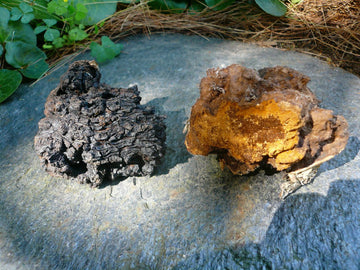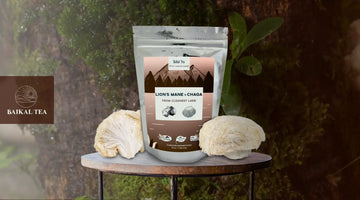Chaga tea, derived from the medicinal mushroom Inonotus obliquus, has gained popularity in recent years for its potential health benefits. However, it's important to understand that like any other natural remedy, chaga tea may also have side effects. In this article, we will explore the potential side effects of chaga tea, as well as its benefits and how to consume it safely.
What is Chaga Tea?
Chaga tea is made from the fungus Inonotus obliquus, commonly known as chaga mushroom. This mushroom grows on birch trees in cold regions, such as Siberia, Canada, and Alaska. Chaga has been used in traditional medicine for centuries and is believed to possess various medicinal properties.
Chaga tea is prepared by steeping dried or powdered chaga mushrooms in hot water. The resulting beverage has a rich, earthy flavor and is often consumed for its potential health benefits.
Potential Benefits of Chaga Tea

Chaga tea has been associated with several potential health benefits, thanks to its rich composition of bioactive compounds. Some of the potential benefits include:
-
Antioxidant properties: Chaga mushrooms are known to contain high levels of antioxidants, which help neutralize harmful free radicals in the body and protect against oxidative stress.
-
Immune system support: Chaga tea may help strengthen the immune system, thanks to its immunomodulatory properties. It may enhance the activity of immune cells and promote overall immune function.
-
Anti-inflammatory effects: Chaga mushrooms contain anti-inflammatory compounds that may help reduce inflammation in the body. This could be beneficial for managing inflammatory conditions, such as arthritis.
-
Potential anti-cancer properties: Some studies have suggested that chaga mushrooms may possess anti-cancer properties. However, more research is needed to fully understand its effects on cancer cells.
While these potential benefits are promising, it's essential to remember that chaga tea should not replace medical treatments or medications. It should be used as a complementary approach under the guidance of a healthcare professional.
Possible Side Effects of Chaga Tea

Although chaga tea is generally considered safe for consumption, it may cause certain side effects in some individuals. It's crucial to be aware of these potential side effects before incorporating chaga tea into your routine. Let's take a closer look at some of the possible side effects:
1. Allergic Reactions
Individuals with allergies to mushrooms or fungi may be at risk of experiencing allergic reactions when consuming chaga tea. Symptoms can range from mild to severe and may include itching, swelling, hives, or difficulty breathing. If you have a known allergy, it's best to avoid chaga tea or consult with an allergist before trying it.
2. Gastrointestinal Issues
Some individuals may experience gastrointestinal issues when consuming chaga tea in large quantities or on an empty stomach. These issues may include stomach discomfort, bloating, gas, or diarrhea. To minimize the risk of gastrointestinal problems, start with small amounts of chaga tea and gradually increase your intake while monitoring your body's response.
3. Interactions with Medications
Chaga tea may interact with certain medications, including anticoagulants, antiplatelet drugs, and immunosuppressants. These interactions could potentially interfere with the effectiveness of the medications or lead to unexpected side effects. If you are taking any prescription medications, it's essential to consult with your healthcare provider before incorporating chaga tea into your routine.
4. Blood Sugar Regulation
Chaga tea may affect blood sugar levels, particularly in individuals with diabetes or those taking medications to manage their blood sugar. Due to its blood sugar lowering effects, it may exaggerate the actions of existing medications for diabetes. Hence, it's important to monitor blood sugar levels closely when consuming chaga tea and work with a healthcare professional to adjust medication dosages if necessary.
5. Liver Function
Limited studies suggest that chaga tea may affect liver function in high doses. While more research is needed to fully understand this potential side effect, individuals with liver conditions should exercise caution when consuming chaga tea and consult with their healthcare provider.
Safe Consumption and Precautions
To minimize the risk of side effects and ensure safe consumption, here are some guidelines to follow when incorporating chaga tea into your routine:
-
Quality and Source: Choose high-quality chaga mushrooms from reputable sources to ensure purity and minimize the risk of contamination.
-
Dosage: Start with small amounts of chaga tea and gradually increase the dosage to assess your body's response. Follow recommended guidelines or consult with a healthcare professional for personalized advice.
-
Moderation: Avoid excessive consumption of chaga tea. Stick to moderate amounts and do not exceed the recommended daily intake.
-
Consultation: If you have any underlying health conditions, are pregnant or breastfeeding, or are taking medications, it's crucial to consult with your healthcare provider before consuming chaga tea.
-
Allergies: If you have known allergies to mushrooms or fungi, it's best to avoid chaga tea or consult with an allergist before trying it.
By following these precautions and consulting with healthcare professionals when necessary, you can safely enjoy the potential benefits of chaga tea while minimizing the risk of side effects.
Conclusion
Chaga tea is a popular beverage known for its potential health benefits. While it offers promising antioxidant, immune-boosting, and anti-inflammatory properties, it's important to be aware of the potential side effects. Allergic reactions, gastrointestinal issues, interactions with medications, blood sugar regulation, and liver function are some possible side effects to watch out for.
To ensure safe consumption, choose high-quality chaga mushrooms, start with small amounts, and consult with healthcare professionals if you have any underlying health conditions or are taking medications. Remember, chaga tea should not replace medical treatments, and it's always best to seek guidance from healthcare professionals for personalized advice.
By being informed and responsible, you can enjoy the potential benefits of chaga tea while minimizing the risk of side effects. Cheers to your health and well-being!
Additional Information:
While chaga tea offers potential health benefits, it's important to note that scientific research on its effects is still "considered" limited. Many studies have been conducted on animals or in laboratory settings, and more human studies are needed to confirm the benefits and assess long-term safety. It's always advisable to rely on evidence-based information and consult with healthcare professionals for personalized advice.
Remember: Each individual is unique, and what works for one person may not work for another. It's essential to listen to your body, pay attention to any changes or discomfort, and adjust your consumption accordingly. If you experience persistent or severe side effects, discontinue use and seek medical attention.






